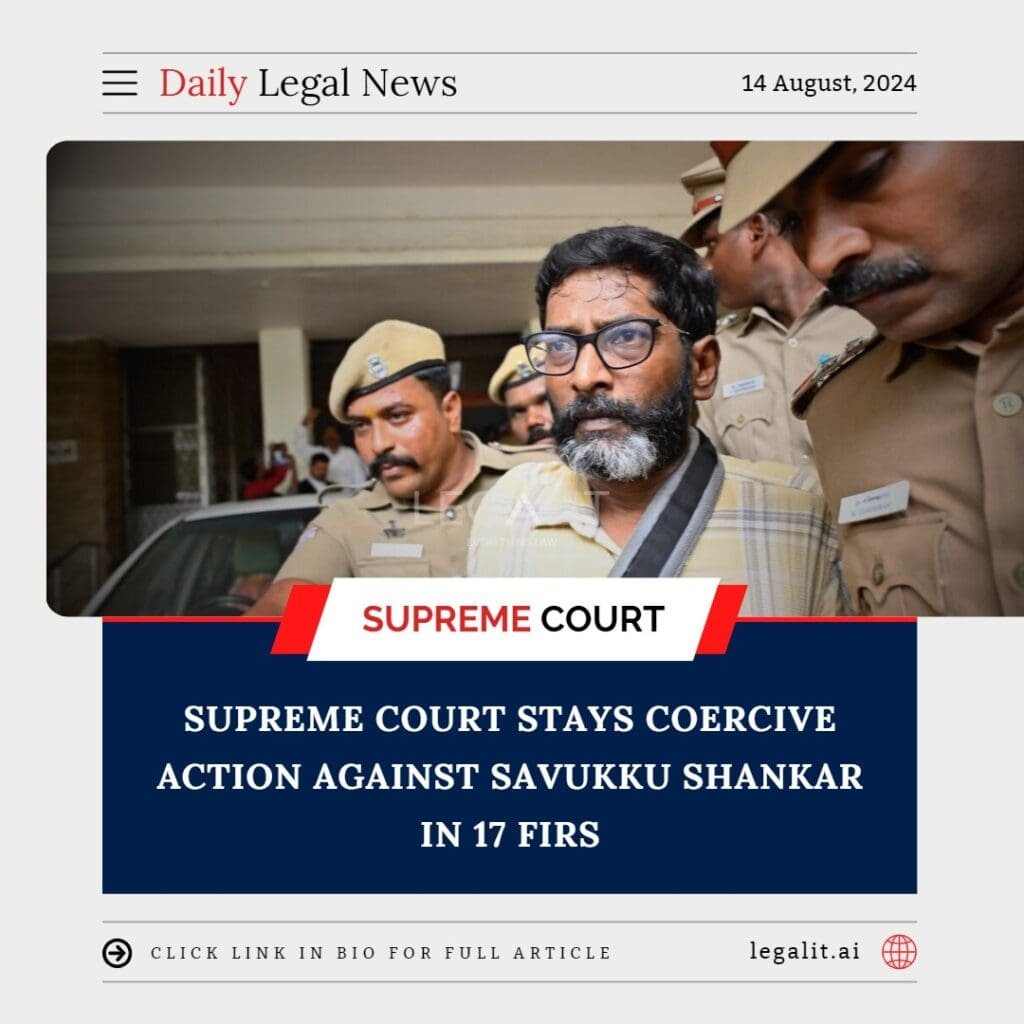
In a significant legal development, the Supreme Court of India has ordered a stay on coercive action against Savukku Shankar, a well-known political commentator and whistleblower, in connection with 17 First Information Reports (FIRs) filed against him. This decision underscores the Court’s concern about the potential misuse of the legal process to target individuals and highlights the importance of protecting the rights of those who use their platform for public commentary and whistleblowing.
Background of the Case
Savukku Shankar, a controversial figure known for his outspoken views on political and social issues, has faced multiple FIRs over his comments and actions, which have often been critical of various public figures and government institutions. The FIRs cover a range of allegations, including defamation, incitement, and violations of various laws related to public order and security.
Shankar’s supporters argue that these FIRs are part of a broader attempt to silence him due to his critical stance against the establishment, viewing the legal actions as a form of harassment. On the other hand, his detractors believe that his provocative statements warrant legal scrutiny.
Given the large number of FIRs and the nature of the allegations, Shankar approached the Supreme Court seeking protection from what he described as coercive and punitive legal actions.
Supreme Court’s Ruling
- Stay on Coercive Action: The Supreme Court issued a stay on any coercive measures, such as arrest or detention, that could be taken against Savukku Shankar in relation to the 17 FIRs filed against him. This stay provides Shankar with temporary relief, protecting him from immediate legal action while the case is reviewed.
- Protection of Rights: The Court’s decision reflects its role in protecting individual rights, especially in cases where there is a risk of misuse of the legal system to target individuals for their speech or activism. The stay indicates the Court’s recognition of the potential for harassment in cases involving multiple FIRs on similar grounds.
- Review of FIRs: The Court is likely to review the merits of the FIRs to determine whether they constitute legitimate legal claims or are part of an attempt to suppress free speech. This review will be crucial in deciding the future course of legal proceedings against Shankar.
Implications of the Ruling
The Supreme Court’s decision to stay coercive action against Savukku Shankar has several significant implications:
- Protection of Free Speech: The ruling underscores the judiciary’s role in safeguarding free speech, particularly for individuals who challenge the status quo or speak out against powerful figures. It sends a message that the legal system should not be used as a tool to stifle dissent.
- Judicial Scrutiny of Multiple FIRs: The stay on coercive action in multiple FIRs suggests that the Court will closely examine cases where there are numerous FIRs on similar grounds, which could indicate a pattern of harassment or misuse of legal processes.
- Legal Precedent: The decision sets a precedent for how the judiciary might handle similar cases involving multiple FIRs against individuals, particularly those involved in public commentary, activism, or whistleblowing.
- Public and Political Reactions: The case is likely to draw significant public and media attention, with reactions from both supporters and critics of Shankar. The outcome could influence public discourse on the limits of free speech and the role of the judiciary in protecting civil liberties.
Moving Forward
As the case proceeds, several key actions and considerations will be important:
- Detailed Judicial Review: The Supreme Court will need to conduct a thorough review of the FIRs to determine their validity and whether they were filed with legitimate legal grounds or as a form of harassment.
- Arguments from Both Sides: Both the prosecution and Shankar’s legal team will present arguments regarding the merits of the FIRs and the broader implications for free speech and the use of legal processes.
- Final Judgment: The Court’s final judgment will have a significant impact on Shankar’s legal situation and could set a broader precedent for how similar cases are handled in the future.
- Public Discourse: The case will likely continue to be a focal point in discussions about free speech, the role of the judiciary, and the potential for misuse of legal processes against activists and commentators.
Conclusion
The Supreme Court’s decision to stay coercive action against Savukku Shankar in relation to 17 FIRs is a crucial step in ensuring that the legal process is not misused to target individuals for their speech or activism. The ruling highlights the importance of judicial oversight in protecting civil liberties and maintaining a balance between enforcing the law and safeguarding individual rights. As the case moves forward, it will be a significant test of the judiciary’s role in upholding free speech and preventing the abuse of legal processes.